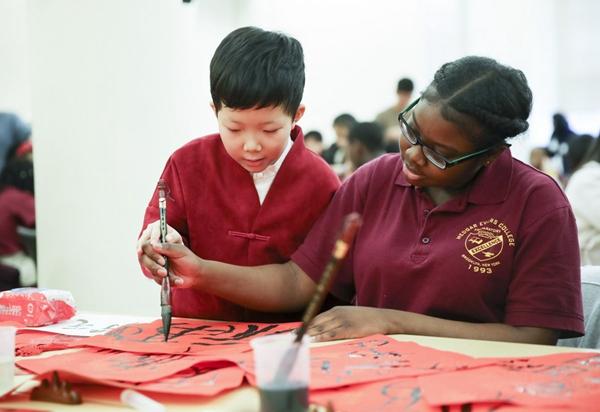Xi-Biden meeting expected to help stabilize consequential bilateral ties: Expert
 0 Comment(s)
0 Comment(s) Print
Print E-mail Xinhua, November 13, 2023
E-mail Xinhua, November 13, 2023

A student from Beijing teaches a student from Medgar Evers College Preparatory School of New York to practice Chinese calligraphy during a culture exchange event in New York, the United States, Feb. 2, 2018. [Photo/Xinhua]
The upcoming meeting between Chinese President Xi Jinping and U.S. President Joe Biden in San Francisco must strive to "stabilize the relationship" between the world's two largest economies, a U.S. expert has said.
"They definitely have a very complex agenda that the two men are going to have to address. But first and foremost, they're going to have to figure out a way how to stabilize the relationship," said Denis Simon, a distinguished fellow of the Institute for China-America Studies, in a recent interview with Xinhua.
Simon also served as a professor of Global Business and Technology at the University of North Carolina at Chapel Hill and the executive director of the Center for Innovation Policy at the Law School at Duke University.
"There must be greater clarity about which road we're on, where we're headed, and how we're going to get to some kind of long-term workable relationship between the two countries," said Simon, voicing hope that the wisdom and the leadership of the two leaders can bring "a better tomorrow."
"It is incumbent upon both countries and the leaders to find a pathway forward to reduce tensions and to make it worthwhile for the citizenry in both countries to benefit from the engagement between the two governments," he said.
Simon voiced hope that the recent positive signs the U.S.-China ties have witnessed can "lead to a better relationship."
"The fact that the exchange of senior leaders is occurring is a good thing," said Simon, noting that the trips made by various senior officials from the two countries are indications that "something positive is happening."
"And those signals, they filter down into the general population," said Simon.
Simon said that people-to-people exchanges between the two countries have shown strong momentum, citing the Philadelphia Orchestra's ongoing visit to China as a "very good omen."
The Philadelphia Orchestra first visited China in the early 1970s. "It had such a positive experience way back in the 1970s, I think it is going to have a very good experience again this time."
Simon has over 40 years of experience studying and working in China. From 2015-2020, he held the post of Executive Vice Chancellor of Duke Kunshan University, in Jiangsu Province.
"I'm a big believer in people-to-people diplomacy. I think if we look at the last 40-plus years of U.S.-China relations, the people-to-people dimension has grown far beyond what anyone would have imagined," said Simon.
The connections among universities, think tanks, research institutes, corporations, as well as cultural organizations, art, literature and music have all become "an integral part of the relationship," Simon said.
"They've all become part of the glue, in fact, that has held the two countries together, even in times of difficult political situations," he said.
He also called for a renewal of the Science and Technology Cooperation Agreement, initially signed in 1979 and extended recently.
"I'm hoping that it can be renewed," he said, noting that adding new points to the documents will give greater comfort to both sides.
Upholding a cautiously optimistic attitude towards current relations, he said, "The best of the future is yet to come."
"It's been a big boulder sometimes in the way. But I'm hopeful ... that there is a brighter future, working together than remaining estranged from one another," Simon said.






Go to Forum >>0 Comment(s)